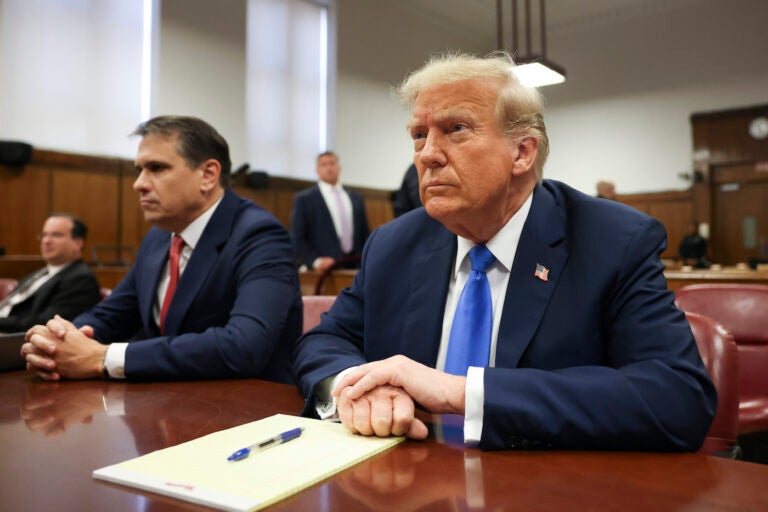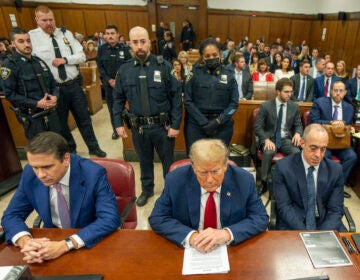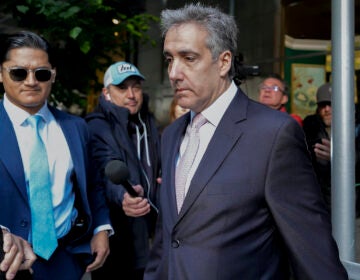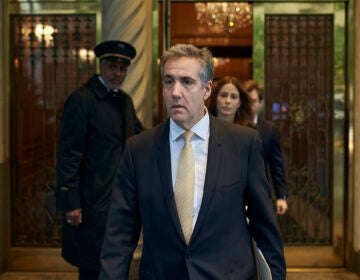Judge holds Trump in contempt, fines him $9,000 and raises threat of jail in hush money trial
The court won't tolerate "willful violations of its lawful orders and that if necessary and appropriate under the circumstances, it will impose an incarceratory punishment."

Former president Donald Trump, center, awaits the start of proceedings at Manhattan criminal court, Monday, April 22, 2024, in New York. Opening statements in Donald Trump's historic hush money trial are set to begin. Trump is accused of falsifying internal business records as part of an alleged scheme to bury stories he thought might hurt his presidential campaign in 2016. (AP Photo/Yuki Iwamura, Pool)
Trump investigations 101
- Former President Trump faces upwards of 100 felony counts after being indicted four times within the last year
- He is accused in Georgia and D.C. of plotting to overturn his 2020 election loss
- He is accused in Florida of hoarding classified documents, and in Manhattan of falsifying business records stemming from hush money payments made during his 2016 campaign
Donald Trump was held in contempt of court Tuesday and fined $9,000 for repeatedly violating a gag order that barred him from making public statements about witnesses, jurors and some others connected to his New York hush money case. And if he does it again, the judge warned, he could be jailed.
Prosecutors had alleged 10 violations, but New York Judge Juan M. Merchan found there were nine. Trump stared down at the table in front of him as the judge read the ruling, frowning slightly.
The ruling was a stinging rebuke of the Republican former president’s insistence that he was exercising his free speech rights and a reminder that he’s a criminal defendant subject to the harsh realities of trial procedure. The judge’s subtle threat to jail a former president signaled that Trump’s already precarious legal standing could further spiral depending on his behavior during the trial.
Merchan wrote that he is “keenly aware of, and protective of,” Trump’s First Amendment rights, “particularly given his candidacy for the office of President of the United States.”
“It is critically important that defendant’s legitimate free speech rights not be curtailed, that he be able to fully campaign for the office which he seeks and that he be able to respond and defend himself against political attacks,” Merchan wrote.
Still, he warned that the court would not tolerate “willful violations of its lawful orders and that if necessary and appropriate under the circumstances, it will impose an incarceratory punishment.”
With that statement, the judge drew nearer the specter of Trump becoming the first former president of the United States behind bars.
Trump is used to having constant access to his social media bullhorn to slam opponents and speak his mind. After he was banned from Twitter following the Jan. 6, 2021, attack on the Capitol, Trump launched his own platform, where his posts wouldn’t be blocked or restricted.
Trump’s campaign was already fundraising off the violations. And he has long tried to distance himself from controversial messages he’s amplified to his millions of followers by insisting they’re “only retweets.”
But he does have experience with gag orders, which were also imposed in his civil fraud trial. After he was found to have violated those orders, he paid more than $15,000 in fines.
Tuesday’s ruling came at the start of the second week of testimony in the historic case, in which Manhattan prosecutors argue Trump and his associates took part in an illegal scheme to influence the 2016 presidential campaign by purchasing and then burying negative stories. He has pleaded not guilty.
Trump was ordered to pay the fine by the close of business Friday. Merchan also ruled that he must remove seven offending posts from his Truth Social account and two from his campaign website by 2:15 p.m. EDT Tuesday, Merchan said. The judge is also weighing other alleged gag order violations by Trump and will hear arguments Thursday.
Of the 10 posts, the one Merchan ruled was not a violation came on April 10, a post referring to witnesses Michael Cohen and Stormy Daniels as “sleaze bags.” Merchan said Trump’s contention that he was responding to previous posts by Cohen “is sufficient to give” him pause on whether the post was a violation.
Among those he found to be violations, Merchan ruled that a Trump post quoting Fox News host Jesse Watters’ claim that liberal activists were lying to infiltrate the jury “constitutes a clear violation” of the gag order. Merchan noted that the words contained within the quotation marks in Trump’s April 17 post misstated what Watters actually said.
“ Thus, in this court’s view, this post constitutes the words of defendant himself,” Merchan wrote.
Merchan cautioned that the gag order “not be used as a sword instead of a shield by potential witnesses” and that if people who are protected by the order, like Cohen, continue to attack Trump “it becomes apparent” they don’t need the gag order’s protection. Cohen has said he will refrain from commenting about Trump until after he testifies at the trial.
In other developments, testimony resumed Tuesday with Gary Farro, a banker who helped Cohen, Trump’s former attorney, open accounts, including one that Cohen used to buy the silence of porn performer Stormy Daniels. She alleged a 2006 sexual encounter with Trump, which he denies. Farro first took the stand Friday and told jurors how Cohen asked to set up two accounts, though one was never technically opened.
Within a day of opening the second account using the name Essential Consultants LLC in October 2016 and funding it with about $130,000 from his own home equity loan, Cohen wired out $130,000 to Keith Davidson, then a lawyer for Daniels, documents showed. The 2016 presidential election was on Nov. 8.
Farro said Cohen indicated the transaction was related to a real estate transaction — not a political candidate, an adult film performer or buying up a potential media story.
“We might consider something like that a reputational risk,” he said.
Jurors so far have heard from two other witnesses. Trump’s former longtime executive assistant, Rhona Graff, recounted that she recalled once seeing Daniels at Trump’s office suite in Trump Tower and figured she was a potential contestant for one of Trump’s “Apprentice”-brand shows.
And former National Enquirer publisher David Pecker laid out how he agreed to serve as the Trump campaign’s “eyes and ears” by helping to squelch unflattering rumors and claims about Trump and women. Pecker described how he paid $180,000 to scoop up and sit on stories from a doorman and former Playboy model Karen McDougal but didn’t involve himself in the Daniels payout.
Trump says all the purchased stories were false. His attorneys used cross-examination to suggest Trump was really engaged in an effort to protect his name and his family — not to influence the outcome of the presidential election.
Trump is charged with 34 felony counts of falsifying business records in connection with the hush money payments. He has denied any wrongdoing and pleaded not guilty.
The detailed evidence on business transactions and bank accounts is setting the stage for testimony from Cohen, who went to federal prison after pleading guilty in 2018 to campaign finance violations and other crimes. It’s unclear when he will take the stand.
The trial — the first of Trump’s four criminal cases to come before a jury — is expected to last for another month or more. And with every moment Trump is in court, he’s growing increasingly frustrated while the November election moves ever closer.
For his part, Trump has been campaigning in his off-hours, but he is required to be in court when it is in session, four days a week. Outside the courtroom Tuesday, he again criticized the case.
“This is a case that should have never been brought,” he said.

Get daily updates from WHYY News!
WHYY is your source for fact-based, in-depth journalism and information. As a nonprofit organization, we rely on financial support from readers like you. Please give today.




